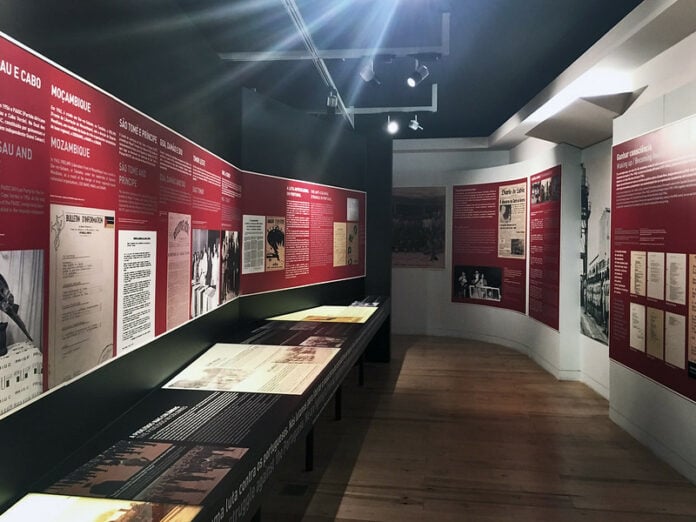The Aljube Museum – Resistance and Freedom in Lisbon, also known as the Museu do Aljube Resistência e Liberdade, presents a stark reminder of beautiful Portugal’s ugly and turbulent past. Dedicated to the fight against one of the longest-lasting authoritarian regimes in 20th-century Europe, beginning with the Ditadura Militar in 1926 and evolving into the Estado Novo from 1933 to 1974, it offers a deep dive into a painful yet pivotal era.
This museum showcases the resilience and courage in the struggle for freedom and democracy, vividly narrating Portugal’s journey from oppression to liberation. Within its walls, visitors can explore the remnants of Portugal’s dark past, including the cells that once confined political prisoners, revealing a chilling narrative of resistance and hope.
History
The history of the Aljube building traces back to Roman and Islamic times. Originally named from the Arabic “al-jubb,” meaning a well without water, cistern, or dungeon, it has predominantly served as a prison. Over the centuries, it transformed from an ecclesiastical prison to a women’s prison, and notably, a political prison from 1928 to 1965. This evolution mirrors the changing societal and political landscapes of Portugal.
Adjacent to the Sé Catedral (Lisbon Cathedral), the Aljube became infamous as a political prison during António de Oliveira Salazar’s dictatorship from 1932 to 1968. The Estado Novo era under Salazar was a time of fear and oppression, with the government employing a vast network of informants and spies, reminiscent of Stasi-era Berlin.
The Aljube Museum, which opened on April 25, 2015, the 41st anniversary of the Carnation Revolution, vividly brings to life this era in Lisbon, telling the stories of prisoners, unions, students, and ordinary people who dared to resist the regime.
It celebrates the eventual collapse of the Estado Novo, culminating in the peaceful Carnation Revolution of 1974. The museum’s exhibits, including multimedia presentations, provide a comprehensive and emotional journey through this significant chapter in Portuguese history.
Architecture
Spread over five levels, the museum facilitates a journey through Portugal’s difficult history in chronological order from the basement of the building to the top floor. Visitors enter on Floor 0 but should first check out Floor -1 to see a small archaeology exhibit revealing the Aljube’s ancient foundations, dating back to at least the time of the Moors. Floor 0 contains the gift shop, concierge, and temporary exhibitions. The main entrance of the former Prison of Aljube, now closed, can also be seen at this level.
Floors 1 to 3 include the museum’s permanent collection, each dedicated to different aspects of the Portuguese dictatorial regime and the resistance against it. This includes a memorial to political prisoners, an exploration of censorship and political repression, and a tribute to the anti-colonial struggle. Additionally, the museum houses a specialized library and temporary exhibition spaces, offering a comprehensive educational experience.
The top floor celebrates the moment of revolution on April 25, 1974, and serves as a place of sanctuary after the difficult and emotionally draining stories of torture and oppression from the floors below. On the top floor, visitors can also find a narrow balcony offering a panoramic view of the Sé Catedral’s roof. Take some time here to recover from what you have just witnessed and reflect on how far Portugal has come today.
Visiting Times & Tickets
The opening hours for the Museu do Aljube Resistência e Liberdade are as follows:
Open Tuesday to Sunday from 10:00 AM – 6:00 PM (Last entry at 5:30 PM)
Closed:
- Mondays
- January 1st
- May 1st
- December 25th
Ticket Pricing:
- Regular Price: €3
- Discount 50% (€1.50): For individuals between the ages of 13 and 25
- Discount 15% (€2.60): For senior citizens not residing in Lisbon (+65)
- People with Disabilities + Accompanying Person: Free
- Free Admission for:
- Children up to 12 years old
- Ages 13 to 23 (Lisbon residents) – Cultural Pass
- Senior citizens residing in Lisbon (+65) – Cultural Pass
- Sundays and holidays until 2 PM (residents of the municipality of Lisbon)
- May 18th (International Museum Day)
- April 25th
- Accredited researchers and teachers
- Journalists and tourism professionals in the performance of their duties (upon presentation of proof)
- Regular visitors of the Documentation Centre and Library
- Note: For reduced prices and free entrance, proof of eligibility is required.
Payment Methods:
- Cash
- ATM
- MBway
Tickets can also be purchased online.
Group tours are available for groups of up to 25 people with a prior appointment. The schedule is made upon request, on every day of the week, Monday to Friday, and the visits take place from Tuesday to Sunday.
Guided tours can be conducted in Portuguese, English and French. Please contact Judite Álvares by email [email protected], [email protected] or phone 215 818 536.


